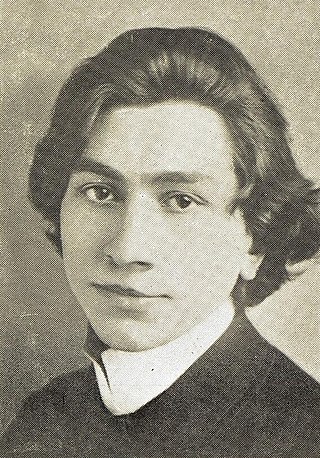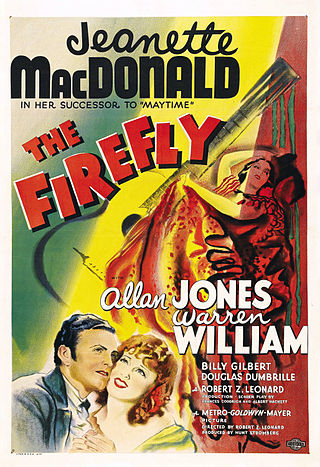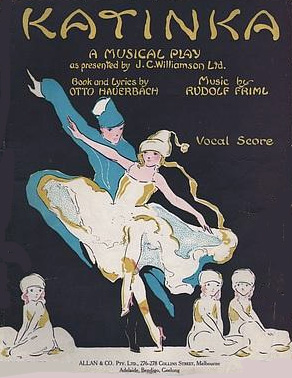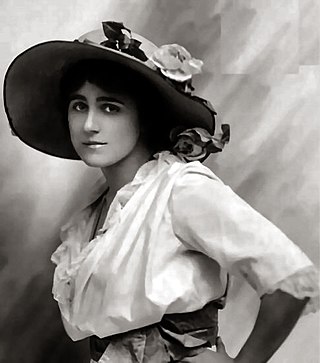Related Research Articles

Musical theatre is a form of theatrical performance that combines songs, spoken dialogue, acting and dance. The story and emotional content of a musical – humor, pathos, love, anger – are communicated through words, music, movement and technical aspects of the entertainment as an integrated whole. Although musical theatre overlaps with other theatrical forms like opera and dance, it may be distinguished by the equal importance given to the music as compared with the dialogue, movement and other elements. Since the early 20th century, musical theatre stage works have generally been called, simply, musicals.

Otto Abels Harbach, born Otto Abels Hauerbach was an American lyricist and librettist of nearly 50 musical comedies and operettas. Harbach collaborated as lyricist or librettist with many of the leading Broadway composers of the early 20th century, including Jerome Kern, Louis Hirsch, Herbert Stothart, Vincent Youmans, George Gershwin, and Sigmund Romberg. Harbach believed that music, lyrics, and story should be closely connected, and, as Oscar Hammerstein II's mentor, he encouraged Hammerstein to write musicals in this manner. Harbach is considered one of the first great Broadway lyricists, and he helped raise the status of the lyricist in an age more concerned with music, spectacle, and stars. Some of his more famous lyrics are "Smoke Gets in Your Eyes", "Indian Love Call" and "Cuddle up a Little Closer, Lovey Mine".
This is a list of notable events in music that took place in the year 1924.
This is a list of notable events in music that took place in the year 1916.
This is a list of notable events in music that took place in the year 1912.

Rodgers and Hammerstein was a theater-writing team of composer Richard Rodgers (1902–1979) and lyricist-dramatist Oscar Hammerstein II (1895–1960), who together created a series of innovative and influential American musicals. Their musical theater writing partnership has been called the greatest of the 20th century.

Charles Rudolf Friml was a Czech-born composer of operettas, musicals, songs and piano pieces, as well as a pianist. After musical training and a brief performing career in his native Prague, Friml moved to the United States, where he became a composer. His best-known works are Rose-Marie and The Vagabond King, each of which enjoyed success on Broadway and in London and were adapted for film.

Rose-Marie is an operetta-style musical with music by Rudolf Friml and Herbert Stothart, and book and lyrics by Otto Harbach and Oscar Hammerstein II. The story is set in the Canadian Rocky Mountains and concerns Rose-Marie La Flemme, a French Canadian girl who loves miner Jim Kenyon. When Jim falls under suspicion for murder, her brother Emile plans for Rose-Marie to marry Edward Hawley, a city man.

Little Mary Sunshine is a musical that parodies old-fashioned operettas and musicals. The book, music, and lyrics are by Rick Besoyan. The original Off-Broadway production premiered November 18, 1959 at the Orpheum Theatre in New York City's East Village. Staying in the neighborhood, it moved to the Player's Theatre on June 21, 1961, then, finally, to the Cherry Lane Theatre on March 21, 1962. Closing was Sept. 2, 1962. Combined run was 1,143 performances. It was seen briefly in a West End production in 1962 and has become a popular show for amateur and semi-professional groups in the United States and elsewhere.

The Lyric Theatre is a West End theatre in Shaftesbury Avenue in the City of Westminster. It was built for the producer Henry Leslie, who financed it from the profits of the light opera hit, Dorothy, which he transferred from its original venue to open the new theatre on 17 December 1888.

The Shaftesbury Theatre was a theatre in central London, England, between 1888 and 1941. It was built by John Lancaster for his wife, Ellen Wallis, a well-known Shakespearean actress. The theatre was designed by C. J. Phipps and built by Messrs. Patman and Fotheringham at a cost of £20,000 and opened with a production of As You Like It on 20 October 1888.

The Vagabond King is a 1925 operetta by Rudolf Friml in four acts, with a book and lyrics by Brian Hooker and William H. Post, based upon Justin Huntly McCarthy's 1901 romantic novel and play If I Were King. The story is a fictionalized episode in the life of the 15th-century poet and thief François Villon, centering on his wooing of Katherine De Vaucelles, and relating how he becomes “king for a day” and defends France against the invading forces of the Duke of Burgundy.
The Three Musketeers is a musical with a book by William Anthony McGuire, lyrics by Clifford Grey and P. G. Wodehouse, and music by Rudolf Friml. It is based on the classic 1844 novel by Alexandre Dumas, père. Set in France and England in 1626, it recounts the adventures of a young man named d'Artagnan after he leaves home to become a Musketeer of the Guard. The three men of the title are his friends Athos, Porthos and Aramis.

The Firefly was the first operetta written by composer Rudolf Friml, with a libretto by Otto Harbach. The story concerns a young Italian girl, who is a street singer in New York. She disguises herself and serves as a cabin boy on a ship to Bermuda, where she falls in love. Complications arise, and eventually, she becomes a grand opera diva.

The Firefly is a 1937 American historical musical film directed by Robert Z. Leonard and starring Jeanette MacDonald, Allan Jones and Warren William. The film is an adaptation of the operetta of the same name by composer Rudolf Friml and librettist Otto A. Harbach that premiered on Broadway in 1912. The film used nearly all of the music from the operetta but jettisoned the plot in favor of a new storyline set in Spain during the time of the Emperor Napoleon I. It added a new song, "The Donkey Serenade", which became extremely popular, as was one of the Friml songs, "Giannina Mia". The original release prints of the film were elaborately tinted with Sepia-Blue, Sepia-Orange and Sepia-Blue-Pink.

Rose-Marie is a 1928 American silent drama film directed by Lucien Hubbard. It was the first of three Metro-Goldwyn-Mayer adaptations of the 1924 operetta Broadway musical Rose-Marie. The best-known film adaptation starring Nelson Eddy and Jeanette MacDonald was released in 1936; another film was released in 1954. All three versions are set in the Canadian wilderness.

Katinka is an operetta in three acts composed by Rudolf Friml to a libretto by Otto Harbach. It was first performed at the Park Theatre in Morristown, New Jersey, on December 2, 1915, with May Naudain in the title role and subsequently received its Broadway premiere on December 23, 1915 at the 44th Street Theatre.

Ivy Troutman was an American supporting actress active during the first half of the twentieth century. She acted in at least twenty-one Broadway productions between 1902 and 1945, appearing in such long-running plays as A Pair of Sixes, Baby Mine and The Late George Apley. In the 1920s Troutman, with her husband, portrait painter Waldo Peirce, joined the colony of American expatriates in Paris that included Gertrude Stein, F. Scott Fitzgerald, Zelda Fitzgerald and Ernest Hemingway.

Dew Drop Inn is a musical with music by Alfred Goodman and Rudolf Friml, lyrics by Cyrus Wood, and a book by Walter DeLeon and Edward Delaney Dunn. While Goodman was the principal composer for the work, composers Rudolf Friml, John Frederick Coots, and Jean Schwartz also contributed songs to the show in collaboration with lyricist McElbert Moore.

Catherine Chisholm Cushing was an American writer of songs, librettos, and plays, best known for her 1916 stage adaptation of Eleanor H. Porter's Pollyanna.
References
- 1 2 "High Jinks – Broadway Musical – Original". Internet Broadway database. Retrieved March 30, 2019.
- ↑ Everett, p. 21
- ↑ Everett, p. 24